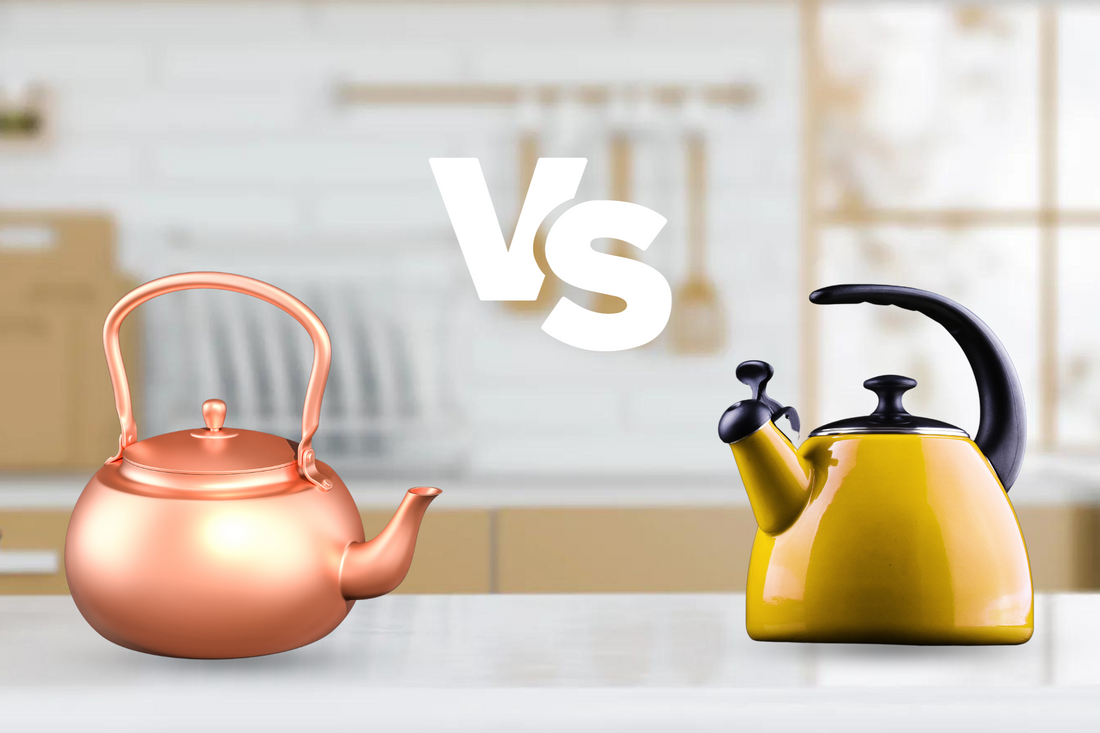Copper tea kettles offer excellent heat conductivity and a stylish look, while stainless steel tea kettles provide durability and efficient heating.
When it comes to brewing your favorite cup of tea, choosing the perfect tea kettle can make all the difference. While most tea drinkers are focused on factors such as boiling speed and durability, there’s a secret ingredient that can make your tea even more enjoyable – the material of your tea kettle.
In this blog post, we’ll compare the best copper tea kettle and stainless steel tea kettle so you can decide which one is best for you. We’ll dive into the benefits of each material, the maintenance required, and other factors to consider before making your purchase.
Pros and Cons of Copper vs Stainless Steel Tea Kettles
Tea drinkers know that a solid tea kettle is a vital tool in any kitchen. But with so many different options available, how do you choose the right one? Let's analyze the pros and cons of copper versus stainless steel tea kettles.
Copper Tea Kettles

|
Pros:
Cons:
|
Stainless Steel Tea Kettles

|
Pros:
Cons:
|
Factors to Consider When Purchasing a Tea Kettle
When purchasing a tea kettle, several factors must be considered to ensure that you're making the right investment. First and foremost, think about the size of the kettle you need. Are you making tea for just yourself or a group of people?
Next, consider the material of the kettle. Stainless steel and glass are both popular options, but each has benefits and drawbacks. You'll also want to think about the design and style of the kettle, as it will likely be on display in your kitchen.
Finally, don't forget about the ease of maintenance and cleaning. These factors may seem small, but they can make a big difference in the functionality and longevity of your new tea kettle. By keeping these factors in mind, you'll be able to select a tea kettle that meets your needs and makes your daily tea routine that much more enjoyable.

Considerations When Buying a Copper or Stainless Steel Tea Kettle
When buying a copper or stainless steel tea kettle, some key considerations must be remembered.
Quality
Irrespective of the material, the kettle's quality is paramount. A well-made kettle will not only last longer but also perform better.
Design
Depending on your kitchen decor and personal preference, the kettle's design may play a substantial role in your purchase decision. While copper kettles often have a more vintage appeal, stainless steel kettles can offer a sleek, modern look.
Size
The size of the kettle should align with your tea-drinking habits. A bigger kettle may be more suitable if you frequently host tea parties or have a large family. Conversely, a smaller kettle will suffice if you're the only tea drinker in your house.
Heat Source Compatibility
Not all kettles are compatible with all types of stovetops. Make sure the kettle you choose is suitable for your heat source, whether gas, electric, or induction.
Ease of Cleaning
Since copper kettles require a bit more maintenance to keep them shiny and free from oxidation, consider how much time and effort you're willing to put into the care of your kettle. Stainless steel kettles can be cleaned with a simple dish soap and water solution.
Remember, the right kettle fits your needs and preferences while offering good value for your money.
,
Frequently Asked Questions
Is A Copper Kettle Better Than Stainless Steel?
Copper and stainless steel have different benefits. Stainless steel is durable and heats efficiently, while copper offers excellent heat conductivity and a stylish appearance. Both are good choices for tea kettles, but it depends on your preferences and needs.
What Is The Best Metal For A Tea Kettle?
Copper, stainless steel, and cast iron are good tea kettle options. Copper provides excellent heat conductivity and a stylish look. Stainless steel offers durability and efficient heating. Cast iron offers heat retention and a traditional appeal.
Is Copper Good For Tea Kettles?
Copper tea kettles are suitable because copper conducts heat well, making them efficient for boiling water. They are also durable, beautiful, hygienic, and free of harmful chemicals and toxins. On the other hand, stainless steel kettles offer durability and efficient heating.
Each material has its benefits and drawbacks.
What Is The Best Material For Boiling Water For Tea?
Stainless steel is the best material for boiling water for tea due to its durability, efficient heating, and easy cleaning. It is rust- and tarnish-resistant, making it a popular choice for tea kettles. Copper is also a good option, offering excellent heat conductivity and a stylish look.
Conclusion
Overall, when comparing copper and stainless steel tea kettles, it's essential to consider each material's specific qualities and benefits. Stainless steel provides durability and efficient heating, while copper offers excellent heat conductivity and a stylish look. Both materials have unique benefits and drawbacks, so it ultimately comes down to personal preference and priorities.
Whether you prefer the sleekness of stainless steel or the elegance of copper, both options can make a great addition to your tea brewing experience.

